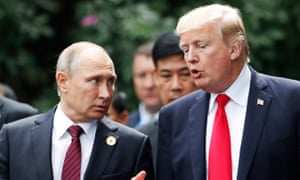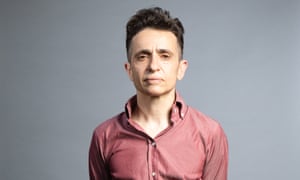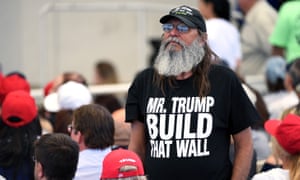Four years ago, the author predicted that Trump would transform the US into an autocracy. Now, Gessen believes the country is in a revolutionary moment
- Read an extract from Masha Gessen’s Surviving Autocracy

Masha Gessen is a Russian-American author and journalist who has been writing about Vladimir Putin and other modern autocrats for two decades. After Donald Trump was elected president of the United States in 2016, they wrote an essay in the New York Review of Books arguing that it was folly to regard him as a regular politician and predicting that he would attempt to transform America into a Putin-style autocracy. Gessen’s new book, Surviving Autocracy, demonstrates how Trump has come closer to achieving autocratic rule than most people would have thought possible.
How do you feel about your predictions having come to pass?If you look at the essay, I think it holds up awfully well, unfortunately. There’s nothing in it that I would walk back. At the same time, a lot of the things that have happened in the past three years have shocked me.
Such as?The latest scene with the bible in front of St John’s church, for instance. The iconography of that, including the clearing of the square with tear gas, the Black Hawk helicopters – it was chilling.
Who’s worse, Putin or Trump?In a way, I think Trump is worse. I never thought I would hear myself say that. They share a lot of characteristics although they are temperamentally extremely different men. They both have this contempt for excellence, they both have a hatred of government, and they both have this way of campaigning against government as such, even as presidents of their respective countries. I think in the end, Putin is somewhat less cynical. He has an idea – it is self-aggrandising and absurd on the face of it – that if he stepped away Russia would fall apart and so he has to carry this burden. And for his labours he deserves to have the yachts and the palaces and all that. But he is doing it for his country. Trump doesn’t even have that delusion. It’s all power and money in their purest form. And you could dig as deep as you want, you would never find a shred of responsibility.

Can Americans rely on their institutions – the electoral system, the judiciary, the free press – to save them from Trump’s autocracy?There’s a way in which Americans think about our institutions as a kind of religion. There’s a faith in the wisdom of the founding fathers who put down these sacred words, this idea that we have the perfect self-repairing system and it will run in perpetuity if we don’t spoil it. The problem is that many of these institutions are enshrined in political culture rather than in law, and all of them depend on the good faith of the people running them to fulfil their purpose and uphold the constitution. So when someone like Trump becomes president, the institutions become vulnerable. As an example, I think we have seen in the last couple of weeks just how effective Trump’s attempts to weaken the national press have been.
How so?I am talking about the way that the police throughout the country have brutally targeted the media during the Black Lives Matter protests. That’s something that I saw as a foreign correspondent in war zones where there was really no sense of any kind of rules or laws. This happened because for the past four years Trump has been vilifying the media, portraying the media as the enemy of the people, as part of the problem, as part of the great conspiracy to unseat him. And that’s very terrifying.
You were born in Russia, spent your teenage years in America then moved back to Moscow as an adult. Do you feel more Russian or American?It doesn’t really work that way. But when you have emigrated as often as I have, you learn the benefits of being an outsider. I am very comfortable not belonging. I find it extremely beneficial to my work as a journalist to be highly attuned to this culture yet at the same time hovering outside of it. I do sometimes bristle at this idea people have that my having been born in Russia qualifies me to talk about Donald Trump. I’d rather people said 25 years of studying totalitarianism qualifies me to talk about Donald Trump.

What is the most important rule for surviving autocracy?For the state of one’s soul, for the state of one’s mind, I think it is absolutely essential to protest and show outrage. Does that have political consequences? Not immediately and not on its own. But I think what we’re seeing in America right now is several steps on from outrage. It’s outrage, plus organising, plus sustained political activity. The big question is how sustained will it be? If it is sustained in some manner, then I think we are in a revolutionary moment. In the book I talk about how in order to actually survive Trump’s attempt at autocracy we have to give up the idea of some imaginary pre-Trumpian normalcy and commit to reinvention. And that is really what these protests are about.
I don’t think there is anyone who is involved who would say: “Oh, we just have to get rid of Trump.” These protests are about the fatal flaw at the root of this democracy and that’s a really upsetting idea for a lot of somewhat conservative commentators. But culturally and politically Americans have a story of being born of protest. These protests are calling for an American reinvention. They are protesting for a more perfect union.
• Surviving Autocracy by Masha Gessen is published by Granta (£12). To order a copy for go to guardianbookshop.com. Free UK p&p over £15



